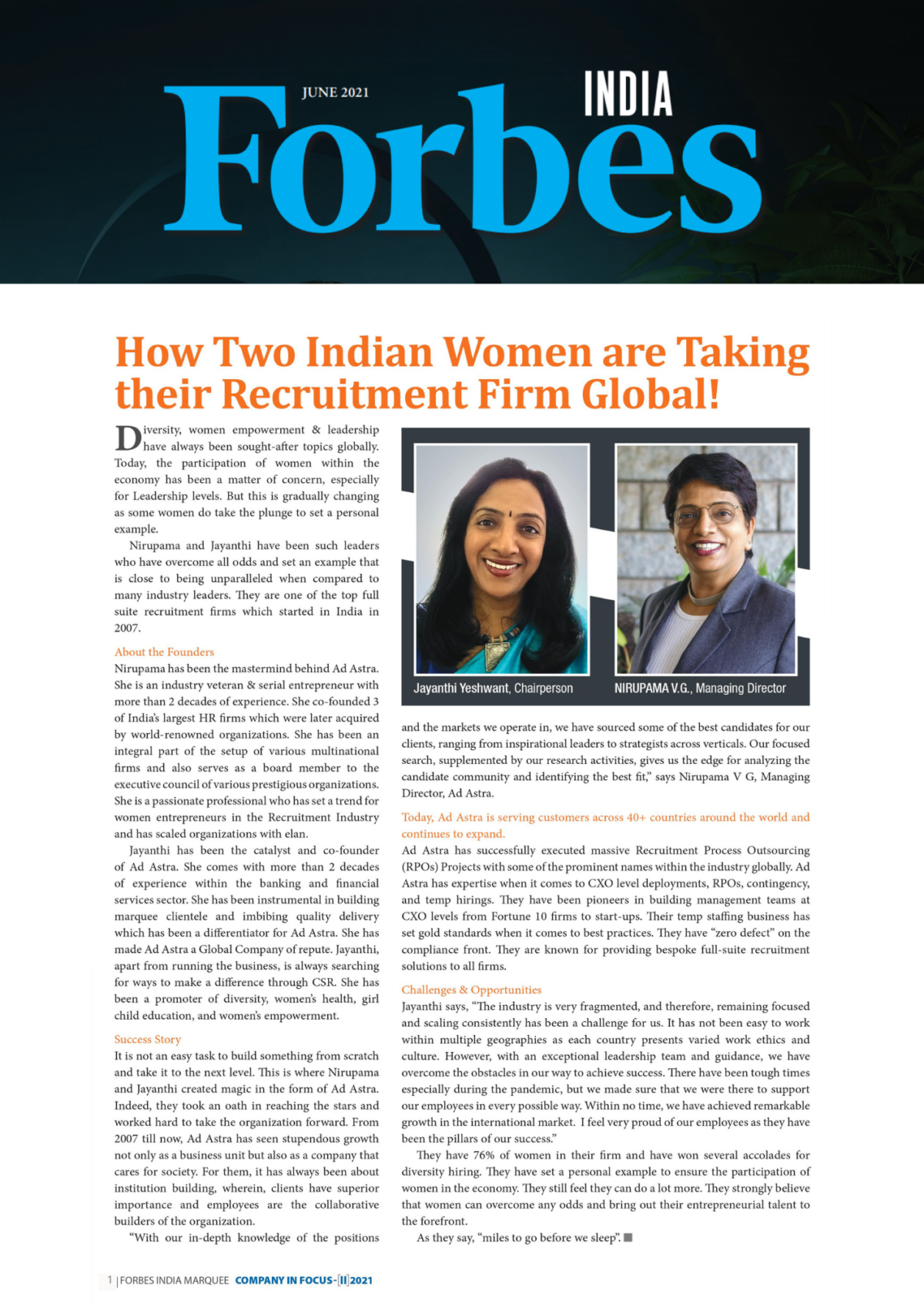Diversity, women empowerment & leadership have always been sought-after topics globally. Today, the participation of women within the economy has been a matter of concern, especially for Leadership levels. But this is gradually changing as some women do take the plunge to set a personal example. Nirupama and Jayanthi have been such leaders who have overcome all odds and set an example that is close to being unparalleled when compared to many industry leaders. They are one of the top full suite recruitment firms which started in India in 2007.
About the Founders
Nirupama has been the mastermind behind Ad Astra. She is an industry veteran & serial entrepreneur with more than 2 decades of experience. She co-founded 3 of India’s largest HR firms which were later acquired by world-renowned organizations. She has been an integral part of the setup of various multinational firms and also serves as a board member to the executive council of various prestigious organizations. She is a passionate professional who has set a trend for women entrepreneurs in the Recruitment Industry and has scaled organizations with elan. Jayanthi has been the catalyst and co-founder of Ad Astra. She comes with more than 2 decades of experience within the banking and financial services sector. She has been instrumental in building marquee clientele and imbibing quality delivery which has been a differentiator for Ad Astra. She has made Ad Astra a Global Company of repute. Jayanthi, apart from running the business, is always searching for ways to make a difference through CSR. She has been a promoter of diversity, women’s health, girl child education, and women’s empowerment.
Success Story
It is not an easy task to build something from scratch and take it to the next level. This is where Nirupama and Jayanthi created magic in the form of Ad Astra. Indeed, they took an oath in reaching the stars and worked hard to take the organization forward. From 2007 till now, Ad Astra has seen stupendous growth not only as a business unit but also as a company that cares for society. For them, it has always been about institution building, wherein, clients have superior importance and employees are the collaborative builders of the organization. “With our in-depth knowledge of the positions and the markets we operate in, we have sourced some of the best candidates for our clients, ranging from inspirational leaders to strategists across verticals. Our focused search, supplemented by our research activities, gives us the edge for analyzing the candidate community and identifying the best fit,” says Nirupama V G, Managing Director, Ad Astra.
Today, Ad Astra is serving customers across 40+ countries around the world and continues to expand.
Ad Astra has successfully executed massive Recruitment Process Outsourcing (RPOs) Projects with some of the prominent names within the industry globally. Ad Astra has expertise when it comes to CXO level deployments, RPOs, contingency, and temp hirings. They have been pioneers in building management teams at CXO levels from Fortune 10 firms to start-ups. Their temp staffing business has set gold standards when it comes to best practices. They have “zero defect” on the compliance front. They are known for providing bespoke full-suite recruitment solutions to all firms.
Challenges & Opportunities
Jayanthi says, “The industry is very fragmented, and therefore, remaining focused and scaling consistently has been a challenge for us. It has not been easy to work within multiple geographies as each country presents varied work ethics and culture. However, with an exceptional leadership team and guidance, we have overcome the obstacles in our way to achieve success. There have been tough times especially during the pandemic, but we made sure that we were there to support our employees in every possible way. Within no time, we have achieved remarkable growth in the international market. I feel very proud of our employees as they have been the pillars of our success.” They have 76% of women in their firm and have won several accolades for diversity hiring. They have set a personal example to ensure the participation of women in the economy. They still feel they can do a lot more. They strongly believe that women can overcome any odds and bring out their entrepreneurial talent to the forefront. As they say, “miles to go before we sleep”.

